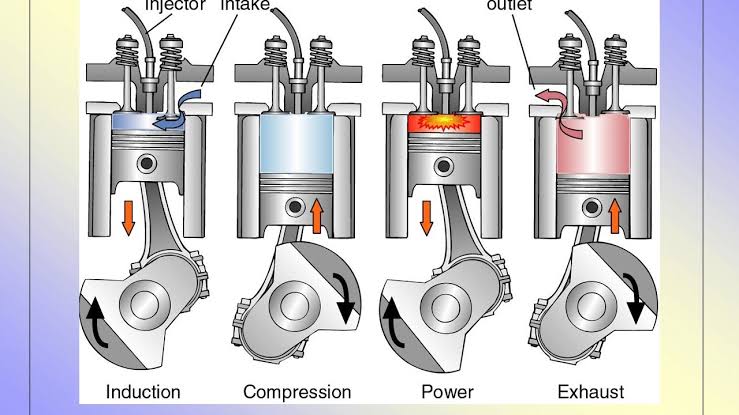The diesel engine is an internal combustion engine that works with adiabatic compression. How diesel engine works is quite different from gasoline engine, making their effectiveness and performance varies. Today I will be exposing you to the working principles of diesel engines, their advantages and disadvantages.

Diesel engines have some characteristics you must know including compression ignition, mixture formation inside the combustion chamber, adjustment of the engine speed due to the mixture quality, heterogeneous air-fuel mixture, high air ratio, diffusion flame, and finally, fuel with high ignition performance. All these are explained in the working principles of the diesel engine. So keep reading!
Contents
Working principles of diesel engine

Diesel engines are designed to ignite fuel without any igniting apparatus such as a spark plug, which is well known on gasoline engines. It uses highly compressed hot air to ignite the fuel rather than using a spark plug. The mixture of air and fuel is done in the combustion chamber and not in the inlet manifold.
The working principles of the diesel engine are so interesting that only air is initially introduced into the combustion chamber. The air is then compressed at a ratio between 15:1 and 23:1 depending on the type of diesel engine and its application. The high compression causes the temperature of the air to rise.
At this point, fuel is injected into the hot air when the compression stroke is about to reach the top. All these take place in the combustion chamber on top of the piston. The fuel injector helps in injecting fuel into the combustion chamber in small droplets and is distributed evenly. The compressed air creates extreme heat causing the fuel to vaporize from the surface of the droplets. The vapor is then ignited using the same heat in the combustion chamber.
The vaporization of the droplets continued until they are completely burnt. The combustion occurs at a substantially constant pressure during the initial part of the power stroke. When combustion is complete the combustion gases expand as the piston descends further; the high pressure in the cylinder drives the piston downward, supplying power to the crankshaft.
The adjustment of the engine speed is sorely by the mixture quality. That is, the amount of torque produced is set solely by the mass of injected fuel, always mixed with as much air as possible. This results in the crankshaft rotational speed differences. The high compression ratio of the diesel engine has enabled its working efficiency high. The lack of a throttle valve allows the charge exchange to lose a low amount, resulting in low consumption of fuel. These make the diesel engine more economical.
Watch how a diesel engine works in the below video:
So the big question today is, what are the advantages and disadvantages of diesel engines…
Advantages of Diesel engines
The diesel engine has several advantages over the engine with other working principles. The followings stated below are the applications of diesel engines.
1. It has the highest effective efficiency of all combustion engine
2. The diesel engine can combust a huge variety of fuel
3. Low fuel costs. That is, it is economical.
4. It has a high energy density
5. Good lubrication properties
6. Low risk of catching fire, as flammable vapor is not produce
7. Injection of fuel directly into the combustion chamber, have no intake of air restriction apart from the air filters.
8. Diesel engines have very good exhaust-emission behavior.
Disadvantages of diesel engines
Despite the great advantages of diesel engines, it still has some limitation. The followings are the disadvantages of diesel engines.
1. Cars with Diesel engines usually cost more than a standard vehicle
2. The cost of diesel fuel is pricey in most geographic regions.
3. Maintenance of diesel engines and repair cost more.
4. You may not have as much access to the fuel that you need with diesel.
5. The new diesel fuel doesn’t have the same lubricating qualities.
6. It is difficult to start a diesel engine in cold weather.
7. Diesel engines make much more noise than their gasoline counterparts.
Related Article:
- Do Diesel Engines Have Catalytic Converters?
- Do Diesel engines have Spark Plugs
- Diesel engine and gasoline engine: Detailed explanation
- Difference between petrol and diesel engine
- Understanding diesel engine
- Diesel engine and gasoline engine: Detailed explanation
- Lists of best diesel injector cleaner
- Understanding the applications of diesel engine
- Understanding two-stroke diesel and gasoline engines
In this guide “working principles, advantages and disadvantages of diesel engines. We hope you found this post useful and enjoyed the read. If you did, please consider sharing this post with your friends and fellow students on social media.

Leave a Reply